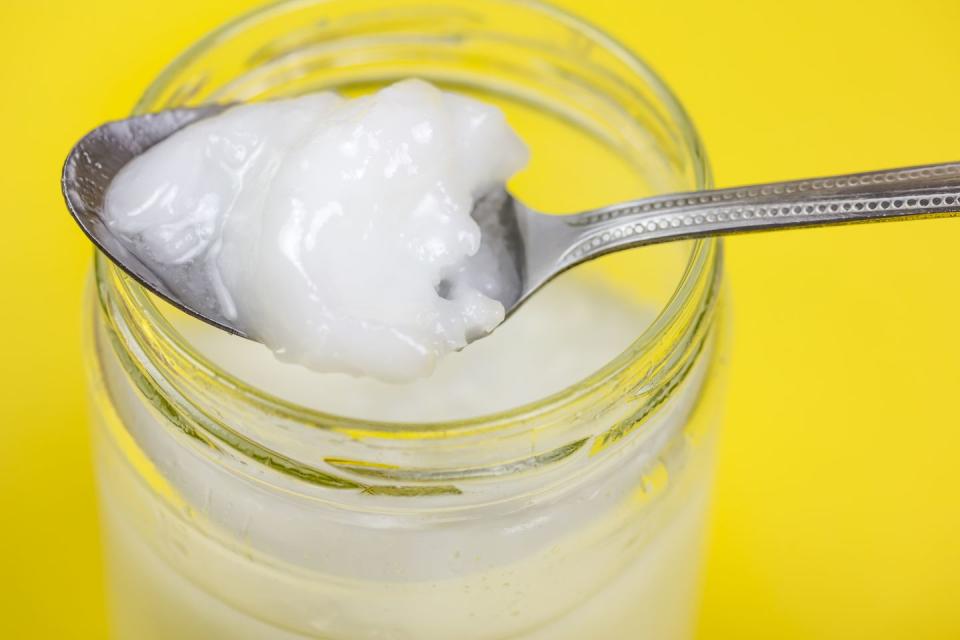Does Coconut Oil Actually Help You Lose Weight?

From bullet proof coffee to hair masks to cooking spray, there's no doubt coconut oil is one of the trendiest sources of fat on the market.
The New York Times surveyed Americans and a panel of nutritionists in 2016 and found that 72 percent of people consider the oil to be healthy, which explains why there's so many health and beauty products enriched with the magical ingredient.
But how many nutritionists from the survey categorized the oil as a health food? Less than 30 percent, likely because not many are aware that coconut oil is 90 percent saturated fat - the kind of fat that raises your cholesterol levels and increases your risk of heart disease.
The Presidential Advisory Board of the American Heart Association (AHA) went so far as to advise against consuming the fat all together in 2017, because of its ability to increase your "bad" LDL cholesterol to dangerous levels. Yet a disconnect still exists between experts and the general public about the health properties of the oil, specifically related to how it can help with weight loss.
According to certified nutritionist and naturopathic physician Bruce Fife, author of The Coconut Oil Miracle and president of the Coconut Research Center, the fat found in coconut oil can help your body burn fat, because the saturated fat found in coconut oil is made of different fatty acids than what's found in other oils, like canola or avocado.
Coconut oil is a medium-chain triglycerides (MCT), which takes another route through the digestive system and competes with glucose to become the body's preferred energy source. The result? A metabolism boost and weight loss in key areas of the body, including dangerous belly fat.
But how much coconut oil do you need to have in a day to lose weight, and is it safe to be eating so much saturated fat? Here are the facts you need to know, according to experts.
How Coconut Oil Can Help You Lose Weight
A small amount of research has found associations between coconut oil and weight loss, mostly centered around the fact that it can keep you full, boost your metabolism, and blast belly fat. But our experts say to proceed with caution.

1. It can boost your metabolism.
MCT oils like coconut oil can help you burn more calories in a day, which may aid with weight loss, according to research.
A study published in the International Journal of Obesity and Related Metabolic Disorders found that the long-term consumption of MCT oil may help you burn more calories than a diet that's heavier in long chain fatty acids, like olive oil, soybean oil, or avocado oil. When your cells use MCTs instead of glucose for fuel, the body's metabolism is boosted for up to 24 hours, Dr. Fife says.
"There's strong data on the weight loss properties of MCT oil in general, but not as much for coconut oil specifically," says Dr. Marie-Pierre St-Onge, Ph.D., associate professor of nutritional medicine at Columbia University. "Coconut oil is only 13.5 percent of purified MCT. To get 10 g of MCT, you need to eat 80 g coconut oil. 80 g of any oil in a single day is a lot of oil, especially coconut oil which is so high in saturated fat."
Furthermore, St-Onge' conducted a study in March 2018 that used showed lower doses of coconut oil and a blend of other MTCs did not increase calorie burn in overweight adolescents.
2. Coconut oil keeps you full.
In its oil form, coconut has been found to satiate hunger for longer periods of time compared to other fats. A small study published in Evidence-Based Complementary Medicine found that consuming virgin coconut oil every day can increase your high-density lipoprotein cholesterol (HDL) "good" cholesterol to enhance satiety.
"Fats are more filling and satiating, so it could potentially help with weight loss from this point of view," says Dr. Neel P. Chokshi, M.D., associate professor of clinical medicine at the University of Pennsylvania. But should you be eating that many grams of saturated fat?
The group consumed 30 mL (30 g) of coconut oil a day for eight weeks, which is about 26 g of saturated fat, to raise their HDL cholesterol. This is nearly double the AHA recommended 13 grams of saturated fat one should be consuming a day.
"As cardiologists, we are concerned when people eat large amounts of coconut oil because of the high saturated fat," Dr. Neel says. "In excess it will raise your cholesterol. We always advise moderation in fat and saturated fat."

3. It can blast belly fat.
Some research has found that consuming coconut oil can burn fat, particularly belly fat, which is dangerous for your heart.
A study published in Lipids gave women either 40 g of coconut oil (MCT) or soybean oil (long chain fatty acid) for 28 days and found that both groups lost weight, but only the coconut oil group had lost belly fat.
But again, 40 g of coconut oil is around 35 g of saturated fat, which is more than twice the amount of daily saturated fat recommended by the AHA.
So, Is Coconut Oil Safe to Eat?
Any food in moderation is OK, Dr. St-Onge says. The AHA suggests aiming for 5 to 6 percent of your daily calories to be saturated fat, which is around 13 grams.
Dr. St-Onge recommends choosing oils that are low in saturated fats and have heart health benefits, like olive oil, canola oil, and soybean oil. But if you are going to go for the coconut, here's what to keep in mind:
1. Choose the right type of coconut oil.
Dr. Fife recommends using organic, unrefined, virgin coconut oil, which has the least amount of processing. However, if you can't stand the strong coconut taste or smell of unrefined coconut oil, opt for a refined version - buying organic will ensure it was refined using steam, not chemicals.
2. Use it to cook.
Introduce coconut oil into your diet by using it as a substitute for margarine, vegetable oil, and/or olive oil when you're cooking up delicious food.
3. Add it to salads.
Liquid coconut oil can be added to salad recipes or homemade mayonnaise to help digestion and maximize nutrient uptake, Dr. Fife says.
4. Try it with rice.
Adding a teaspoon of coconut oil to the boiling water for every half-cup of rice may reduce the number of calories your body takes in by 50 to 60%, according to research by the American Chemical Society. Let the coconut-oil water and rice simmer for 20 to 40 minutes, and then refrigerate it for 12 hours.
('You Might Also Like',)

